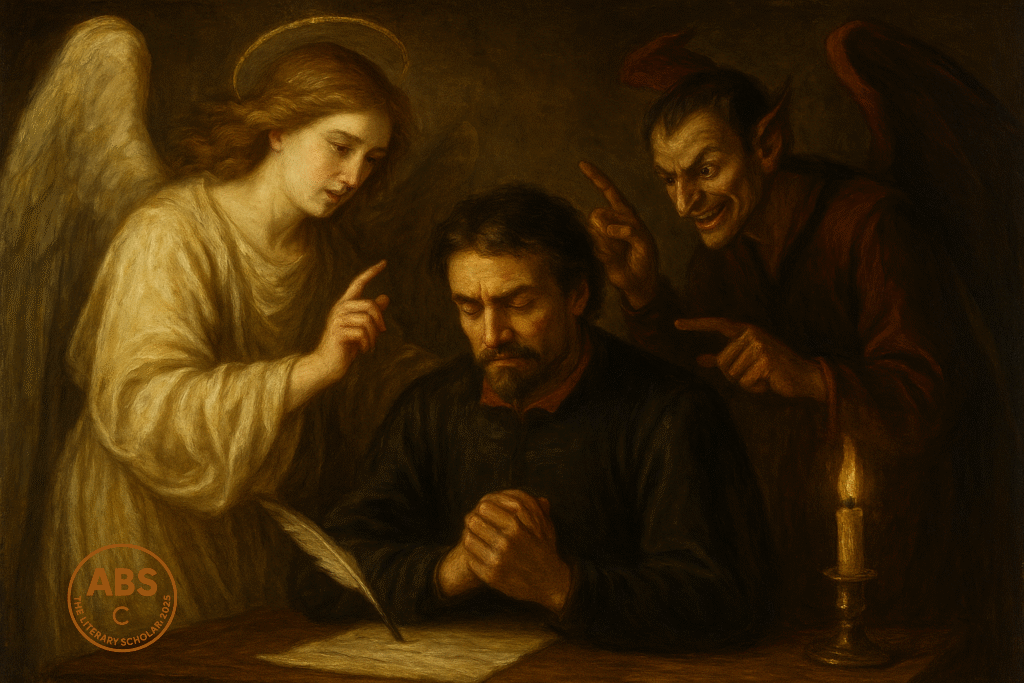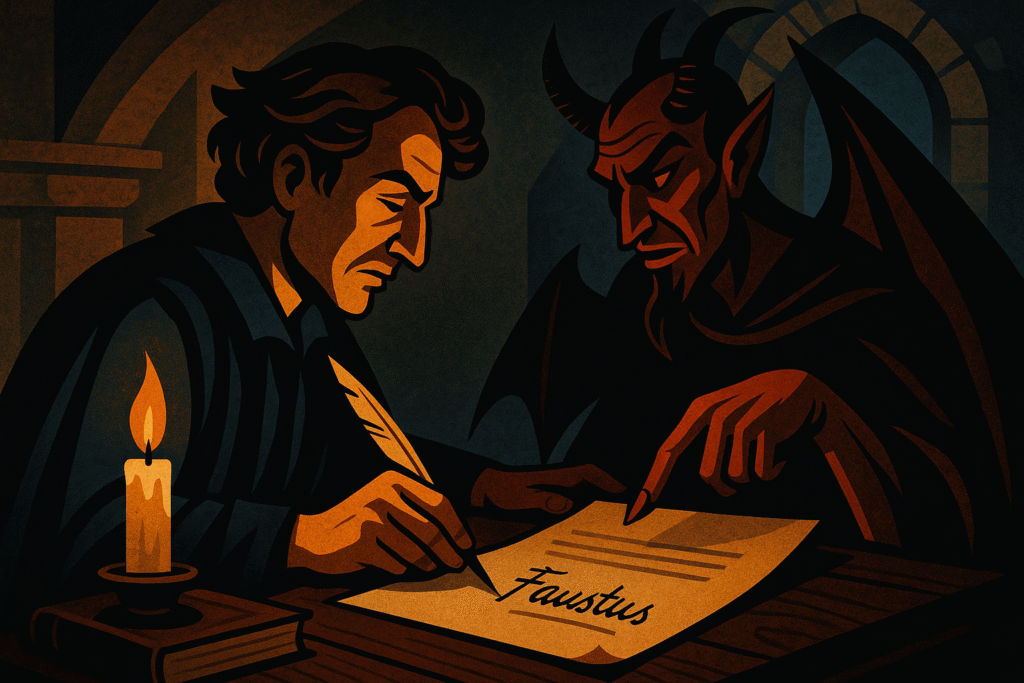When the Thirst for Knowledge Burns the Soul that Seeks It
By ABS, The Literary Scholar
If Renaissance theatre had a warning label, Doctor Faustus would come with the words:
“May cause damnation, disillusionment, and dark laughter. Handle with hubris.”
Christopher Marlowe’s Doctor Faustus is not just the story of a man who sells his soul to the devil. It’s the tale of a man who wanted Google, godhood, and glory—four hundred years before Wi-Fi.
Faustus is not evil. That would be too easy. He’s brilliant, curious, theatrical—and bored. And that, dear reader, is the beginning of every great literary disaster.
Opening Scene: When Learning Isn’t Enough
When we first meet Faustus, he’s surrounded by books, Latin scrolls, and a growing disdain for all conventional knowledge.
Law is petty. Medicine is glorified guesswork. Theology is too restrictive. Philosophy is fine—but it’s not enough. He wants more.
So, naturally, he decides to summon the devil.
Because what’s a man of letters to do when letters fail?
Answer: dip the pen in blood.
Mephistopheles: The Devil’s Best-Dressed Salesman
Enter Mephistopheles—not with horns and pitchforks, but with grace, logic, and eerily good customer service. He doesn’t beg for Faustus’s soul. He doesn’t need to. Faustus practically offers it on a monogrammed scroll.
When Faustus asks him what hell is, Mephistopheles responds:
“Why, this is hell, nor am I out of it.”
Now that’s a line worthy of a therapist’s notebook—or a modern existentialist.
Mephistopheles is not just a demon. He’s regret, dressed in Renaissance robes. And when he weeps in Act II, for just a moment, we see it:
Hell isn’t heat. It’s separation. It’s knowing too late.
The Blood Pact: Signing with Ego, Not Ink
Faustus doesn’t just agree to sell his soul—he signs a formal bond. In blood. While making jokes. And fainting dramatically.
This isn’t tragedy—it’s pageantry.
He doesn’t stumble into sin. He hosts it.
And the terms? 24 years of power. Spells, spirits, and spectacles. And then? Eternal damnation.
A terrible deal. But he’s not reading the fine print—he’s performing.
Faustus wants to be a magician, but he’s already a mirror: reflecting every scholar who confuses intelligence with invincibility.
Comic Scenes: Where Faustus Wastes His Power Like a Teen with a Credit Card
With all the powers of hell at his fingertips, what does Faustus do?
Plays pranks on peasants.
Scares a horse-courser.
Summons grapes.
Slaps a Pope.
This isn’t world domination. It’s demonic slapstick.
The irony is exquisite: Faustus wanted the secrets of the cosmos. Instead, he becomes entertainment—a cosmic court jester with Mephistopheles as his manager.
And let’s not forget Wagner, his servant, who parodies everything with street-smart wit. The Clown, the Horse-courser, and the bumpkins that follow—all become a chorus of comedic futility around Faustus’s intellectual waste.
The Good Angel and Evil Angel: A Whisper War for the Soul
The moral struggle is staged literally. Two angels—one in white, one in black—appear to Faustus, often just off-stage from his ambition.
They don’t shout. They whisper.
And that’s the genius of Marlowe: the war for the soul is often not loud—it’s internal, persuasive, and private.
The Good Angel says, “Think of heaven, and heavenly things.”
The Evil Angel says, “No, Faustus, think of honor and of wealth.”
Faustus listens with the ears of ego. And every time he chooses the darker voice, we’re reminded: damnation is rarely imposed. It’s invited.
Symbols: Blood, Fire, and the Sound of a Clock
The blood that won’t flow: even Faustus’s own body hesitates. His veins congeal. The body knows what the mind denies.
The Old Man: a symbol of quiet redemption. He pleads, “Touch not that book.” But Faustus is already halfway through the final chapter.
The clock: In the final scene, Faustus counts the hours left before his soul is claimed. Each tick is a thud of consequence. And when midnight comes, it’s not with flames. It’s with silence.
There’s no visible hell. No devils with chains.
Just Faustus screaming:
“Ugly hell, gape not! Come not, Lucifer! I’ll burn my books—ah, Mephistopheles!”
But it’s too late.
Books don’t burn sin. And repentance can’t be retroactive.
The Final Scene: Terror Without Rescue
The ending of Doctor Faustus is one of the most chilling in English literature.
No angel swoops in. No loophole saves him.
Faustus dies as he lived: alone with his choices.
And what’s most terrifying?
We understood him.
We cheered his ambition.
We laughed at his tricks.
We pitied his downfall.
Because Faustus is not a monster. He is us—curious, restless, reckless, and too often convinced that knowledge can protect us from truth.
Why Faustus Still Matters
In an age where we pursue power through screens, data, and constant self-optimization, Faustus is our ancient twin.
He believed that knowing more meant becoming more.
But wisdom isn’t data. It’s restraint.
Faustus didn’t fall because he made a deal with the devil.
He fell because he believed the devil had more to offer than doubt, humility, or grace.
And that is a tragedy we replay every day—in quieter ways, with different devils.
The Literary Scholar closes this scroll with a sigh and a shiver—somewhere, a clock chimes midnight.
By ABS, The Literary Scholar


The Literary Scholar folds this scroll at the edge of firelight and silence. Some books burn the hands. This one? It burns the soul.
By ABS
The Literary Scholar
(Who believes that some contracts don’t need lawyers—just better judgment.)
Share this post / Spread the witty word / Let the echo wander / Bookmark the brilliance
